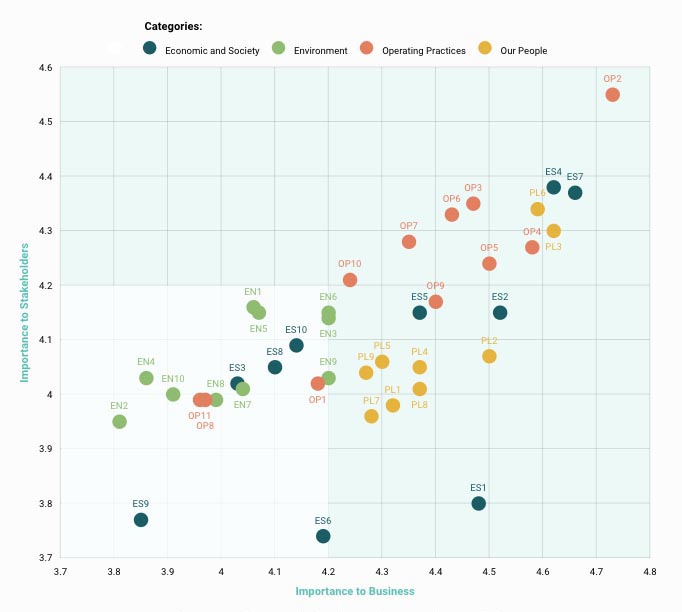Materiality Assessment
In preparing our 2017/18 sustainability report, we directly engaged with the following stakeholder groups as part of the materiality assessment process to identify and prioritise the issues to be covered in this report.
- Employees
- Airport business partners, including franchisees, licensees, retail tenants and airlines
- Suppliers and contractors
- Non-governmental organisations and think tanks
- Trade and industry associations and professional bodies
- Financial institutions
- Academics
- University students
Identify potential issues
- Compiled a master list of sustainability issues from various sources, including material issues identified in previous sustainability reports, internal policies and management reports, media opinions, industry trends, and the GRI reporting framework.
- 40 issues were identified and grouped into 4 categories: Economic & Society, Environment, Operating Practices, and People.
Prioritise issues
- Conducted two online surveys (252 responses, 51%) to rate the importance of each issue from a stakeholder or a business perspective, using a scale of 1 to 5 (1=not important, 5=extremely important)
- Developed the materiality matrix based on the scores of the surveys, set the threshold for materiality (i.e. at a score of 4.2) and prioritised a list of most important sustainability issues.
Senior management validation
- AAHK’s management reviewed the materiality matrix and the threshold for materiality.
- 25 of the 40 issues, with an overall score of 4.2 or above from a stakeholder or a business perspective, were prioritised as the most important sustainability issues for AAHK to address and report on.
The materiality matrix shows the 40 identified issues (as listed below) according to their importance to stakeholders and importance to business. The 25 issues in bold are ranked as the most important.
- ES7 – Infrastructure development
- ES4 – Connectivity
- ES2 – Branding & reputation
- ES1 – Air cargo strategy
- ES5 – Economic contribution
- ES3 – Community investment
- ES6 – Financial management
- ES10 – Supporting the aviation industry
- ES8 – Labour shortage at HKIA
- ES9 – Local community engagement
- EN6 – Green design & construction
- EN3 – Carbon & energy
- EN9 – Waste
- EN1 – Air quality
- EN5 – Environmental management
- EN7 – Material use
- EN8 – Noise
- EN10 – Water
- EN4 – Climate-related risks & impacts
- EN2 – Biodiversity
- OP2 – Airport safety & security
- OP4 – Compliance with laws & regulations
- OP5 – Contingency planning
- OP3 – Capacity constraints
- OP6 – Customer experience
- OP9 – Information security
- OP7 – Facilities management
- OP10 – Innovation & technology
- OP1 – Accessibility
- OP8 – Human rights
- OP11 – Supply chain management
- PL6 – Occupational health & safety
- PL3 – Ethics & integrity
- PL2 – Employee well-being
- PL4 – Employee engagement
- PL8 – Succession planning
- PL1 – Attracting talent
- PL5 – Employee rights
- PL7 – Retention & turnover
- PL9 – Training & career development
We convened an external review committee for the first time to gather independent feedback on:
- The materiality assessment process and the material issues identified,
- The quality of the report, and
- Communications around sustainability and sustainability reporting.
The committee consists of five members:
- Mark Devadason, Senior Advisor, BSR
- Professor Carlos Lo, Director of Centre for Business Sustainability and Professor and Head of Department of Government and Public Administration, The Chinese University of Hong Kong
- Hannah Routh, Partner, Deloitte China
- Kalina Tsang, Head of Hong Kong, Macau, Taiwan Programme, Oxfam Hong Kong
- Dr. Mark Watson, Head of Sustainable Development, John Swire & Sons (H.K.) Ltd
The committee convened twice to review the materiality assessment process and draft report content, as well as to provide advice on our sustainability performance. Feedback collected from the committee will be taken into consideration in the future development of our reporting and sustainability initiatives.

